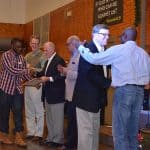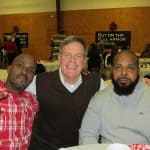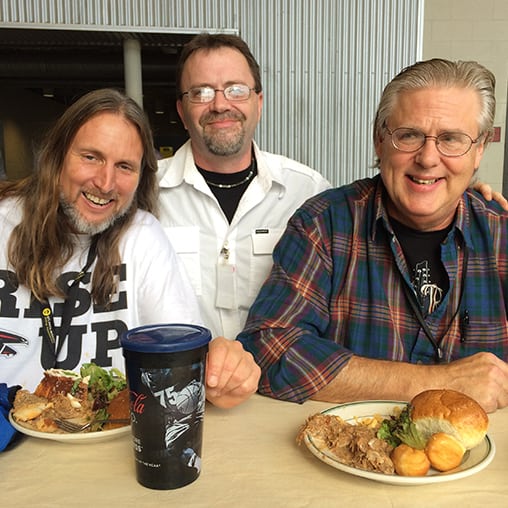
A Call to Manhood
What mentoring opportunities are available to you? Jim Reese, CEO of the Atlanta Mission, tells how he used FamilyLife's resource for men, Stepping Up, to mentor his sons-in-law. Joining Jim is Pastor Ricky Hall, who chimes in about his experience using Stepping Up at the Potter's House, a long-term residential discipleship program for chemically addicted men, as well as the Atlanta Mission.
Show Notes
About the Host
About the Guest
-
What mentoring opportunities are available to you? Jim Reese, CEO of the Atlanta Mission, tells how he used FamilyLife's resource for men, Stepping Up, to mentor his sons-in-law. Joining Jim is Pastor Ricky Hall, who chimes in about his experience using Stepping Up at the Potter's House, a long-term residential discipleship program for chemically addicted men, as well as the Atlanta Mission.
-
Dave and Ann Wilson
Dave and Ann Wilson are hosts of FamilyLife Today®, FamilyLife’s nationally-syndicated radio program. Dave and Ann have been married for more than 38 years and have spent the last 33 teaching and mentoring couples and parents across the country. They have been featured speakers at FamilyLife’s Weekend to Remember® marriage getaway since 1993 and have also hosted their own marriage conferences across the country. Cofounders of Kensington Church—a national, multicampus church that hosts more than 14,000 visitors every weekend—the Wilsons are the creative force behind DVD teaching series Rock Your Marriage and The Survival Guide To Parenting, as well as authors of the recently released book Vertical Marriage (Zondervan, 2019). Dave is a graduate of the International School of Theology, where he received a Master of Divinity degree. A Ball State University Hall of Fame quarterback, Dave served the Detroit Lions as chaplain for 33 years. Ann attended the University of Kentucky. She has been active alongside Dave in ministry as a speaker, writer, small-group leader, and mentor to countless wives of professional athletes. The Wilsons live in the Detroit area. They have three grown sons, CJ, Austin, and Cody, three daughters-in-law, and a growing number of grandchildren.
-
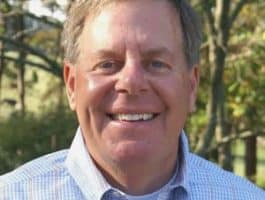
Jim Reese
Jim is President and CEO of Atlanta Mission, headquartered in Atlanta, Georgia. He joined the organization in August 2008. His primary focus is to ensure that Atlanta Mission achieves its vision, “To be the premiere service provider unifying organizational and community efforts to positively change lives through a continuum of programs focused on helping poor and homeless men, women and children in the greater Atlanta area.” Before joining Atlanta Mission, Reese held the following key bus...more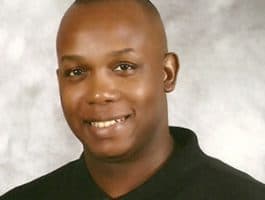
Ricky Hall
Ricky first came to Atlanta Mission in 2010 as a Counselor Intern at The Potter’s House, but he quickly demonstrated an enormous amount of talent and leadership skills. In less than 2 years, he was promoted to full-time Counselor and became a spiritual role model for the residents and staff. Ricky is a licensed and ordained minister that has served churches in Alabama, Mississippi and Georgia for over 20 years. He received his education at the University of Alabama at Birmingham and Berean Sch...more
Jim Reese tells how he used FamilyLife’s resource for men, Stepping Up, to mentor his sons-in-law.
Bob: One of the things that many men, who are in homeless shelters today, have in common is that most of them did not have a dad, active and present in their lives, caring for them. Here’s Ricky Hall.
Ricky: The power of a father—I know from my own life is that my father gave me the ability to dream. He gave me identity. He spoke purpose into me, and he showed me that that purpose was found in God. I think every man longs for that dad, that grandfather, that person in their life, to say: “You can do it! You can accomplish great things.”
Bob: This is FamilyLife Today for Tuesday, May 19, 2015. Our host is the President of FamilyLife®, Dennis Rainey, and I'm Bob Lepine. When a man grows up without a father’s influence in his life, there are still ways that he can begin to understand what it means to be a man.
1:00
We’ll talk about that today. Stay tuned.
And welcome to FamilyLife Today. Thanks for joining us. You know, our listeners have heard, this week, about the opportunity that you had, awhile back, to be in Atlanta and to speak at a graduation for a group of—what was it? —125?
Dennis: I don’t know. Let’s ask Jim Reese, who headed it up.
Jim: About 130 guys—close to 130 guys.
Bob: These are guys who are homeless; right?
Jim: They’re homeless and going through a long-term recovery program.
Bob: So they’re in a long-term recovery program. Part of that recovery program was sitting down and watching Mr. Rainey, every week, talk about manhood.
Dennis: I’ll tell you—the story is a compelling story. I want our listeners to hear about this for two reasons: Number one—I think they’re going to be encouraged by this—but number two: some of our listeners need to get in the game. It may be with homeless men—it may not be with prisoners.
2:00
It may be with somebody at work, or maybe some of your children’s peers from maybe where your children go to school / their parents, and take some men through this series.
First of all, let me introduce our guests. Ricky Hall and Jim Reese join us again on FamilyLife Today. Ricky is the Director of Spiritual Life for the Atlanta Mission, and Jim Reese is the CEO and president.
Jim, I just want to start at the beginning. How did you hear about Stepping Up in the first place?
Jim: Dennis, I had a good friend of mine give me the series. I had—actually, one of the guys that work for us was going through it. When I heard about it and what impact it was having on him, honestly, I was pretty heavily convicted because I had two sons-in-law. I was serving hundreds of men, but the two most important guys in my family—I wasn’t serving.
Dennis: You’re speaking of hundreds of homeless men.
Jim: Yes.
Dennis: How many men a day do you feed at the Atlanta Mission?
3:00
Jim: We serve a thousand people—men, women, and children—about 750 men every day, across our three campuses, and 275 women and children.
Bob: You provide food/shelter. You talked about a program—the long-term program that guys go through. Are these for substance-abuse guys?
Jim: Yes. Substance abuse / job attainment—our whole heart is to move people from homelessness. Our mission statement is: “To transform, through Christ, the lives of those facing homelessness.” We really believe that is the answer. A warm place to stay/food is an entry-point to their heart to have an opportunity to make an impact on them.
Bob: Yes.
Dennis: You know, when we designed this series, we didn’t have homeless men anywhere on the radar-screen; but we really could envision a father-in-law sitting down with his two sons-in-law, wanting to make a difference there. I think you carved some new ground, though, in how you took your two sons-in-law through this series. Explain how you did it.
Jim: Yes. Well, I have one that lives in Birmingham and one that lives in Atlanta.
4:00
I wanted to make it as easy for them as it could be. What we did is—I went to the one close by—about 30 minutes away. I’d meet at his house about a quarter to eight. About eight o’ clock, we would dial in Mike from Birmingham. We would literally, on FaceTime, take our computers, pray, get started, turn the computer around, show it to the DVD, watch it together, and then turn it back around and go through the questions together. It was great! We sat on the couch together—Oliver, I, and Mike. It was really hugely impactful.
Bob: Now, you were doing this all on the recommendation of a friend. You were not familiar with the content before you went through it.
Jim: No, I’d never been through the content at all.
Bob: So, what were you expecting when you put the DVD in for the first time?
Jim: I’ve been in a men’s group for a lot of years. I was really—wasn’t sure what I was expecting because it was the first time I’d done anything like this with my sons-in-law. So I was excited, but I didn’t know what to expect, Bob:
5:00
“Would they be transparent? What would really happen? Would I intimidate them?” So, when the first one came up on courage, I can still remember the night.
Dennis: What happened?
Jim: Well, you know, as we talked about it—Mike, my oldest son-in-law—they had just adopted a little girl that summer. When the question of “Who did you see that was courageous?” Mike shared that they felt the most courageous person in his life was the mom of that girl that had given her up for them to have a daughter of their own. That was just unbelievably impactful, Dennis.
Bob: And your other son-in-law—how’d he answer the question?
Jim: My other son-in-law, Oliver, said an answer I didn’t expect at all. He said, “You, Jim.” “What do you mean?” He said, “Four years ago, when you’d come to the mission, I thought that was the most courageous thing I’d ever seen anybody do. You could have really done anything. Why’d you do that?”
Dennis: You’d stepped out of a career, where you were in charge of—as COO of about 53,000 employees—
6:00
—quite a career track! You left that to go be the CEO and President of one of the largest homeless missions in the country—the Atlanta Mission.
Jim: Yes, I think, Dennis, God had spent 54 years getting me ready for what He really wanted me to do. When I look back at my career, I spent a lot of my career in food business—I spent a lot of my career helping people get jobs. The Lord had grown me, spiritually—so, what are the things that people need?—all of us, honestly—food, clothing, and the opportunity to get to know Christ.
Bob: Ricky, you’re the Director of Spiritual Life for the Atlanta Mission. Your job is to help disciple these guys who are coming through the program.
Ricky: Yes, sir.
Bob: Did you first hear about Stepping Up from Jim?
Ricky: I did first hear about it from Jim. Actually, Jim had given me the series for us to try to integrate it at the Potter’s House and different scenarios.
7:00
Bob: The Potter’s House is that long-term program you do for guys.
Ricky: Yes, sir.
Bob: Right.
Ricky: I had watched some of the videos myself and had privately gotten with some friends and kind of gone through it, but we never officially used it in our program.
Bob: When you were going through the material—when you were watching it on your own—were you thinking, “The guys here could really benefit from seeing this”?
Ricky: Of course! I think the thing that impacted me the most was that I started out as a counselor—working with the men, personally, with all of their issues and problems. A big part of the counseling track is to deal with addictions / drug addictions. The behavior is the surface of what they do, but the real deep issue is why they do it: “What are the motivating factors behind it?”
8:00
Bob: Yes.
Ricky: I saw, as I watched it personally, that at the core of it all—that it dealt with the issues that every man deals with in terms of accepting himself—knowing his identity in God and really having a picture of what a real man looks like. For so many of our guys, they’ve never had that picture.
Bob: See, that’s part of my thinking. When I first heard you guys were using it, I had the thought, “Is this content going to be relatable to a guy who’s a homeless man?” because there are stories of husbands and dads—and it’s kind of normal everyday life. The average homeless person doesn’t know a whole lot of normal everyday life. I really wondered, “Are guys going to be sitting in there, going, ‘I can’t even relate to any of this’?”
Ricky: Well, it’s very relatable because, at the end of the day, everybody wants to be loved / everybody wants to be accepted.
9:00
The power of a father—I know from my own life is that my father gave me the ability to dream. He gave me identity. He spoke purpose into me, and he showed me that that purpose was found in God. I think every man longs for that dad, that grandfather, that person in their life, to say: “You can do it! You can accomplish great things.” It’s a void in the lives of a lot of people that we work with, but this series gave us an opportunity for them to see God answer a lot of those questions and give them something they could focus on.
Dennis: I want to go back to Jim—and the two men who got your daughters in marriage—and just say: “What was the big idea? What did you guys get out of going through Stepping Up together?”
Jim: I think for us, Dennis, it was—one, it really drew us closer together—and I think an opportunity to share.
10:00
One of the things I didn’t realize was that a lot of the practical experiences, and problems I had had, and the mistakes I had made—it created a great environment for me to share those. It was safe / it was easy; but it gave me a chance to really tell them: “Where had I made a mistake?”—that they could learn from those.
I’m positive those conversations might have never taken place—I think there’s no question with my sons-in-law as we went through it together. We really had a chance to truthfully come together at a level we wouldn’t have—the transparency for all of us of what we had done. You know, we talked about my business career, the mistakes I had made, the things I wish I could do differently. My prayer through all that was that they wouldn’t make some of the same mistakes and that they would have a chance to really learn from mine. It was really an unbelievable blessing.
Dennis: It is, as Bob said, it gave you a chance to be authentic—
Jim: Yes.
11:00
Dennis: —to be a real father-in-law and to build a relationship with those guys.
At what point did you begin to turn toward the Atlanta Mission? Here are 750 homeless guys every day that you’re feeding / housing—I mean, you’re taking care of these guys. When did you begin to say: “You know what? We have to take this to those guys.”
Jim: Honestly, I listened to you guys’ radio broadcast about what had happened in the prison ministry. I just knew it would work with our guys—I just said, “We’re going to do it!”
Dennis: You’re speaking, of course, of how a chaplain brought Stepping Up, the video series, into a prison. They had so many guys interested they had to break it into two sessions. They’ve now had—what is it, Bob?—275 men go through Stepping Up out of a prison of 800?
Bob: Yes.
Dennis: So, you decided to bring it to your staff?
Jim: I just said, “We’re going to do it!” Between our staff and those who we serve every day, we all went through it.
12:00
Ricky: When Jim approached me, he basically said, “We need to get this done.” I began to organize the staff—spear-headed it. We got plaques made, we got small group leaders, and we began to execute it over the ten weeks. What I began to see God do in that was—He began to transform the lives of our men to think outside of just being in a program. They began to see a future and a hope for themselves.
Dennis: Talk about one of those men. Introduce us to one of them / tell us a little bit about him.
Ricky: Well, one of the guys that really impacted me was a guy who couldn’t read. As we began to go through the series, we actually had to kind of take the workbook and give him the questions and kind of let him, orally, do it.
13:00
As he began to go through the workbook and answer the questions, he came to me one day at the Potter’s House. He said to me, “You know, I don’t think I’ve ever known how to be a man; but I believe that God is helping me to see how I can really be a blessing to my family.” This is a man that, basically, in his life—he felt like all he had been to his family was a burden—he felt like all he had done was take from them. As he began to go through the series, he began to see that God clearly had put him in a position that, if he was to make some changes and some alterations in his life, that he could have a positive impact on his family.
The people that we serve—they’ve been told all their lives that they’re not going to amount to anything. They’ve been criticized / people stay away from them. But this series gave him hope—
14:00
—this one thing you can’t put a price tag on.
Bob: You and I talked, before we came on air, about Session 4, which is where we profile a guy who made a lot of mistakes in life that ended him up in prison. Your guys aren’t in prison, but they could relate to Ricky’s story in Session 4. That’s really the session where we try to make it clear that the central issue in your life is: “Are you going to honor Christ? Are you going to believe the gospel? Are you going to respond to God?” Just tell us a little bit about the interaction after that session; can you?
Ricky: Well, with the guys I had in my group—that we ran the Session 4 / the powerful story of a man in prison—clearly 80-85 percent of our guys have had some experience with the legal system. Many of them have served two or more years in prison.
15:00
But to see a man that was in prison / behind bars, but yet he was free—it riveted them because they saw that, really, the freedom did not come through circumstances of where you were. It came from the liberating power of Christ to pour His love into your heart—and then the relationship between the pastor and the man in prison—and to see their love. The power of love is the greatest force in the world, and God is love. We had many men accept Christ after that session—that they really began to look at themselves. Although they were in our program, where there are no bars, they really saw that the real freedom comes through Christ.
Bob: You guys have to be good stewards of the resources that have been entrusted to you. Money’s tight as you try to run the mission. Getting workbooks for all the guys—these aren’t guys who can order their own workbooks and pay for them. And then you did it up right with the diplomas that you gave these guys—they were framed.
16:00
Did you have a local church or did you have a benefactor, who came alongside and said, “I want to help make this happen”? I guess I’m trying to think of other homeless ministries, who would say, “We’d love to do something like this,”—but a local church in a community could partner with a homeless shelter and underwrite the costs of something—couldn’t they?
Jim: We chose just to spend the money because we felt it would be worth it. To be honest with you, we felt we needed to invest in this and demonstrate it was important. But I know, especially after going through it and watching the outcomes, don’t miss the opportunity to give someone the chance to bless your men by taking them through this. The responsibility of stewardship is also the responsibility—if God has trusted you with these men—and: “Are you giving them all you could give them? Not just a little, but all you could give them?”
17:00
The thing about the series, to me, that was so powerful that way was—these men don’t think they’re worth it. To go through a series that all men would go through was powerful for them. As you said, the dialogue part was really important; but for them, the video series was a picture that none of them had. When they saw what a man could be, and they had a chance to dream, it changed their lives. They really could talk about that.
I would encourage people in the community: “Do you want to help your local mission? Do you want to help make a difference?” Truly, give them the opportunity to give these men these books, and this series, and go through it with them. You know, one of the most powerful things for our men was to have their own book.
Bob: Yes. I’ve seen guys—that book is like a treasured possession.
Jim: It is. In fact, when Dennis was with us, I think half of them brought it to have it signed because they feel you’re trusting them with something. Having something you’re trusted with is so important for them, but it had an enormous impact.
18:00
I would just encourage people out there to think about how you could help. Food’s important—we have to feed people—but to give them spiritual nourishment will last for eternity. Don’t miss the chance to give them that.
Bob: Dennis, in the providence of God, as you went down for the graduation with these men, who had gone through the series, you were able to bring in two other guys, who are featured in the Stepping Up series. One of them, a local pastor from Atlanta—Jim’s pastor, Crawford Loritts—he speaks throughout the Stepping Up series. Then, you brought a guy from Little Rock, who operates a ministry for homeless people in Little Rock. His story is shared in Session 10 of the Stepping Up series. It was really the three of you who executed that graduation ceremony.
Dennis: I was up there speaking. You guys had steps made for me—
Jim: Right.
19:00
Dennis: —for boyhood, to adolescence, to manhood, and then beyond manhood to the mentor step, and then the patriarch step. As I was in the back, kind of getting ready to come up and speak, it was like: “I can’t get up here and give this message with my friend, Crawford Loritts, in the audience,” because he’s the guy who has the heart for mentoring. He’s the guy who got me in a mentoring conference, ten years ago, with four guys, to begin to mentor them. I am still mentoring a couple of them today. I went to Crawford and I said, “Would you get up and speak at the mentor step?” Then, I went to Brother Paul Holderfield and I said: “Brother Paul, your dad was a patriarch; and you’re on your way. I’d like you to talk about how your dad was a patriarch.”
So, I spoke, Crawford Loritts spoke, Brother Paul spoke. At the end, they gave Brother Paul a standing ovation because here’s a guy who understood their struggle.
20:00
He’s been working with homeless men and women for decades and saw his dad do this as well. Those men, I think, were like sponges—spiritually-hungry, thirsty men, who were broken—just like us—and we said that: “We’re all broken, guys.” And yet, they had found hope / they had found what the Bible had to say about being a man. As a result, got a picture of what it looks like to be a man, a husband, a father.
I have to tell you—I stood in line / I shook—I might have missed a couple out of the 130—but I shook every hand, looked every guy in the eye, and asked him what he got out of it. The stories that flooded at me—guys who had fathered children with multiple women, guys who were divorced, guys who were estranged, guys who had disappointed their parents—filled with shame—but you know what?
21:00
When they met Jesus Christ, they found out: “You know what? I can be forgiven. Grace is real! If I have a few people in my life—like the Atlanta Mission is providing for these guys, who believe in me, and cheer me on, and give me a good start—maybe, just maybe, my legacy will be different than the heritage I was given.”
Bob: Yes. And you know, you stop and think, Dennis: “What’s that worth?—for a guy to be able to turn things around in his own life, and to begin to lay a foundation for future generations—to put the stake in the ground and say: ‘I know where I came from, but I’m going in a different direction. I’m going to a new place.’” I’m thinking of that because I’m thinking about the listeners who pitched in and helped make the Stepping Up video series possible.
22:00
We’re a listener-supported / donor-supported ministry. So, resources like the Stepping Up video series, this daily radio program, our website, other resources we produce—all that we do is made possible because folks, like you, help support FamilyLife Today with financial contributions that enable us to do the work that we’ve talked about today. I think it’s important just to say, “Thank you,” to those of you who have stood with us in the past as partners in this ministry. We’re grateful for those of you who are Legacy Partners and provide monthly support; and we’re grateful for those of you who, from time to time, will make a donation in support of this ministry.
In fact, this month is a particularly good time to consider making a donation because we’ve had some friends of the ministry, who have come along and said, “We’re going to match every donation you receive in the month of May, on a dollar-for-dollar basis, up to a total of $300,000.” That’s a very generous offer, and something that we’re hoping to take full advantage of. Of course, to do that, we need our listeners to join with us again.
23:00
Go to FamilyLifeToday.com. Click in the upper right-hand corner of the home page, where it says, “I CARE”. You can make an online donation, or call 1-800-FL-TODAY to make a donation over the phone. Or you can mail your donation to FamilyLife Today at PO Box 7111, Little Rock, AR; and our zip code is 72223. Let me just say, “Thank you,” in advance, for whatever you’re able to do in support of this ministry. We do appreciate your partnership with us.
Let me also mention—if you’re interested in the Stepping Up video series—either because there’s an organization like the Atlanta Mission in your home town and you’d like to take a series like this and give it as a gift to them, or maybe lead men through this at a local shelter—you could do that. Maybe you just want to get together with some other guys / or fathers and sons get together through the summer—go through the ten-week Stepping Up series on your own. Find out more about the Stepping Up ten-week video series.
24:00
Go to FamilyLifeToday.com. Click the link that says, “GO DEEPER,” in the upper left-hand corner of the screen; and you can order the series from us. Or you can call 1-800-“F” as in family, “L” as in life, and then the word, “TODAY,” to receive a copy of the Stepping Up video series.
Now, tomorrow, we are going to continue to hear from Jim Reese and Ricky Hall about the work that God did in the hearts and lives of the men who went through the Stepping Up series at the Atlanta mission, a few months back. Hope you can tune in for that.
I want to thank our engineer today, Keith Lynch, along with our entire broadcast production team. On behalf of our host, Dennis Rainey, I'm Bob Lepine. We will see you back next time for another edition of FamilyLife Today.
FamilyLife Today is a production of FamilyLife of Little Rock, Arkansas.
Help for today. Hope for tomorrow.
We are so happy to provide these transcripts to you. However, there is a cost to produce them for our website. If you’ve benefited from the broadcast transcripts, would you consider donating today to help defray the costs?
Copyright © 2015 FamilyLife. All rights reserved.
1

